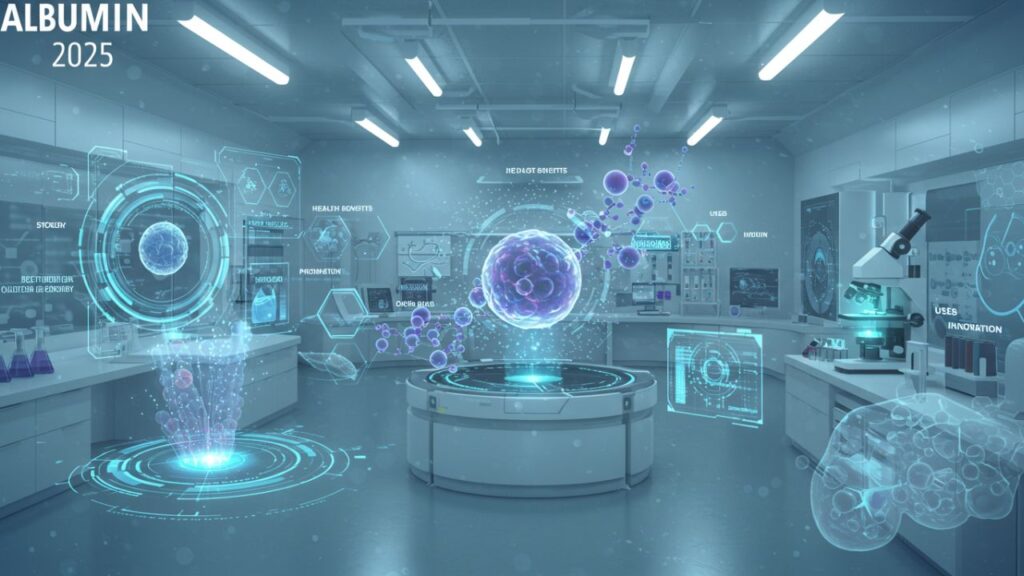Albumīns are among the most important proteins found in the human body and in many living organisms. In 2025, scientific research continues to highlight the essential functions of albumīns, from maintaining blood volume to transporting hormones and drugs. This comprehensive guide explores what albumīns are, their health benefits, applications in medicine, and the latest findings that show why they remain crucial for life.
What Are Albumīns?
Albumīns are a type of simple, water-soluble protein. They are abundant in human plasma, egg whites, and milk. The most well-known example is serum albumin, which is found in blood plasma. This protein plays a key role in maintaining osmotic pressure, which keeps fluids balanced between blood vessels and surrounding tissues.
In simpler terms, albumīns prevent the body from swelling or losing too much fluid. They also act as carriers, transporting hormones, fatty acids, and medications throughout the body.
The Role of Albumīns in the Human Body
Albumīns are not just passive proteins; they actively support essential biological functions. Some of their major roles include:
-
Maintaining blood volume – By controlling fluid balance, albumīns ensure proper circulation.
-
Transporting molecules – They bind and carry hormones, vitamins, fatty acids, and medications.
-
Buffering pH levels – Albumīns help regulate the acid-base balance in blood.
-
Healing and repair – Adequate albumīn levels support tissue repair and recovery.
-
Detoxification – They bind harmful substances for safe removal.
Without sufficient alb-umīns, the body struggles with edema, slow healing, and impaired drug absorption.
Albumīns in Medicine
In clinical settings, albumīns play a major role. Medical professionals use human serum albumin (HSA) as a treatment for conditions where patients lose fluids or proteins. Examples include:
-
Severe burns – Alb-umīns restores lost plasma volume.
-
Shock and trauma – They stabilize blood pressure.
-
Liver disease – Low albumīn levels in cirrhosis are managed with supplementation.
-
Kidney disease – Albumīn loss in urine (albuminuria) is a marker of damage.
-
Nutritional therapy – Patients with malnutrition may need albumīn support.
This makes alb-umīns both a diagnostic tool and a therapeutic option.
Measuring Albumīn Levels
In healthcare, albumīn levels are a key diagnostic marker. A serum albumin test measures the protein concentration in the blood. Normal levels typically range from 3.5 to 5.5 g/dL.
-
Low albumīn (hypoalbuminemia): Suggests malnutrition, kidney disease, liver dysfunction, or chronic inflammation.
-
High albumīn (hyperalbuminemia): Rare, often linked to dehydration or certain medical conditions.
Routine testing helps doctors detect underlying problems early.
Dietary Sources of Albumīns
Albumīns are naturally present in many foods, particularly those rich in protein. Common sources include:
-
Egg whites – A direct form of albumīn.
-
Milk and dairy – Contain serum-like alb-umīns.
-
Lean meats – Provide proteins that help maintain albumīn levels.
-
Legumes – Beans and lentils support protein synthesis.
-
Fish – Rich in protein and omega-3 fatty acids.
A balanced diet ensures the body maintains healthy albumīn levels.
Albumīns and Nutrition
Nutrition plays a major role in albumīn production. The liver synthesizes albumīn using amino acids from dietary protein. Malnutrition, especially protein deficiency, quickly reduces albumīn levels.
In 2025, dietitians recommend high-quality protein intake for patients recovering from surgery, illness, or chronic disease. Supplements such as whey protein are also effective in boosting albumīn synthesis.
Latest Research on Albumīns
Scientific research in 2025 is expanding the understanding of albumīns. Current studies focus on:
-
Drug delivery systems – Albumīns are being engineered as carriers for cancer drugs.
-
Biomarkers – Albumīn levels help predict disease outcomes.
-
Artificial alb-umīns – Lab-made proteins could replace human-derived forms.
-
Longevity studies – Links between albumīn levels and aging are under investigation.
-
Regenerative medicine – Alb-umīns may support stem-cell therapies.
These developments highlight how alb-umīns go beyond traditional roles in health.
Albumīns in Industry
Outside of medicine, albumīns are also used in:
-
Food industry – Egg albumīn is a common stabilizer in baking.
-
Biotechnology – Alb-umīns serve as stabilizers in vaccines.
-
Cosmetics – Certain skincare products use alb-umīns for tightening effects.
This wide range of applications makes alb-umīns valuable beyond biology.
Benefits of Albumīns
Albumīns provide both medical and nutritional benefits. Key advantages include:
-
Supporting fluid balance in the body.
-
Enhancing healing and recovery in patients.
-
Improving drug effectiveness through transport.
-
Serving as a diagnostic tool for doctors.
-
Boosting nutrition in vulnerable populations.
These benefits explain why alb-umīns are considered indispensable proteins.
Challenges with Albumīns
Despite their usefulness, albumīns face challenges in research and application:
-
Limited supply – Human serum albumin requires safe donation sources.
-
High cost – Medical-grade alb-umīns are expensive.
-
Stability issues – Some forms degrade quickly without proper storage.
-
Ethical concerns – Over-reliance on donor-derived proteins raises debates.
Researchers are addressing these issues through synthetic alternatives and improved production methods.
Future of Alb-umīns
The future of albumīns in 2025 and beyond is promising. Advancements in biotechnology may lead to:
-
Synthetic albumīns that are lab-grown and widely available.
-
Smarter therapies using alb-umīns as nanocarriers for precision medicine.
-
Personalized healthcare where albumīn levels guide individualized treatments.
-
Global nutrition programs incorporating albumīn supplementation to fight malnutrition.
As science advances, alb-umīns will likely remain central to healthcare innovation.
Tips for Maintaining Healthy Alb-umīn Levels
To support healthy albumīn production naturally, experts recommend:
-
Eat sufficient protein from lean meats, dairy, and legumes.
-
Stay hydrated to balance plasma levels.
-
Avoid excessive alcohol, which damages the liver.
-
Manage chronic conditions like diabetes and kidney disease.
-
Consult doctors regularly for albumīn testing if at risk.
These lifestyle habits ensure that the body maintains strong albumīn levels.
Conclusion
Albumīns are not just proteins; they are essential building blocks of life. They regulate fluid balance, transport vital molecules, and serve as critical tools in modern medicine. In 2025, their role continues to expand, from traditional healthcare to cutting-edge biotechnology.
Although challenges exist in supply and cost, the future of alb-umīns is bright with the development of synthetic alternatives and new therapeutic uses. Whether through diet, medicine, or technology, alb-umīns remain a cornerstone of human health and industry.





